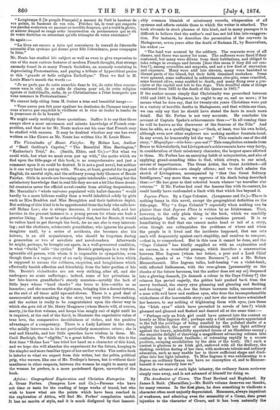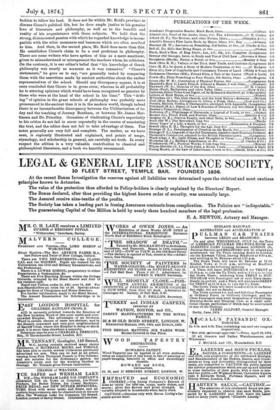The Academica of Cicero. The Text Revised and Explained. By
James S. Reid. (Macmillan.)—Mr. Reid's volume deserves our thanks, for many reasons. In the first place, he does something to vindicate a character often most unjustly depreciated. Mommsen, always impatient of weakness, and admiring even the sensuality of a Cana; does great injustice to the character of Cicero, and it has been naturally the fashion to follow his lead. It does not lie within Mr. Reid's province to discuss Cicero's political life, but he does ample justice to his genuine love of literature and philosophy, as well as to the breadth and reality of his acquaintance with these subjects. We hold that the strong, disinterested passion with which he regarded knowledge is incom- patible with the utter meanness and baseness which are often ascribed to him. And then, in the second place, Mr. Reid does more than this. He establishes Cicero's claim to be a real proficient in philosophy. There are some writers who have spoken of him as a mere smatterer, given to misunderstand or misrepresent the teachers whom he criticises. On the contrary, it is our editor's belief that "his knowledge of Greek philosophy was nearly as accurate as it was extensive." "Cicero's statements," he goes on to say, "are generally tested by comparing them with the assertions made by ancient authorities about the earlier representatives of the school. Should any discrepancy appear, it is at once concluded that Cicero is in gross error, whereas in all probability he is uttering opinions which would have been recognised as genuine by those who were at the head of the school in his time." This "drift- ing" of opinion in the great schools of philosophy was probably more pronounced in the ancient than it is in the modern world, though indeed there is no inconsiderable discrepancy between the Utilitarianism of to- day and the teaching of Jeremy Bentham, or between Mr. James Mar- tineau and Dr. Priestley. Occasions of vindicating Cicero's superiority to his critics do not fail to occur repeatedly in the course of annotating the text, and the editor does not fail to take advantage of them. The notes generally are very full and complete. The matter, as we have seen, is copiously illustrated and explained, and points of usage, etymology, and scholarship in general, are carefully set forth. In every respect the edition is a very valuable contribution to classical and philosophical literature, and a book we heartily recommend.



































 Previous page
Previous page